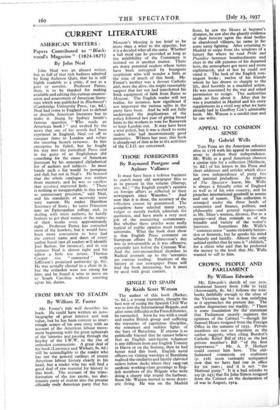CURRENT LITERATURE
AMERICAN WRITERS : Papers Contributed to " Black- wood's Magazine " (1824-1825) By John Neal
John Neal was an absurd writer, but so full of that rich badness admired by King Auberon Quin, that he is still highly readable as a critic, if not as a poet or novelist. Professor Pattee, then, is to be thanked for making available and editing this curious enumer- ation and assessment of American litera- ture which was published in Blackwood's (Cambridge University Press, 13s. 6d.). Neal had come to England not to defend or describe American literature but to make it. Stung by Sydney Smith's famous question " Who reads an
American book ? " and exalted by the news that one of his novels had been reprinted in England, Neal set off to conquer fame in London and refute the sneering Scotch reviewer. In this enterprise he failed, but he fought his way into the periodical Press and in the guise of an Englishman did something for the cause of American literature by his annotated alphabetical list of authors and Subjects. In most hands such a list would be pompous and dull, but not in Neal's. He boasted that the whole catalogue was written from memory, and he was so careless that accuracy mattered little. " There is nothing so insupportable in this world as unnecessary precision," said Neal, and his standards of necessity were very narrow. He makes Hamilton Secretary of State • he turns Princeton into an Episcopalian college and, in dealing with mere authors, he hardly bothers to get their names or the names of their works even approximately right. Professor Pattee has corrected most of the howlers, but it would have been more convenient to have had the correct name and dates of every author listed (not all readers w]l identify Joel Barlow, for instance), and in one instance Neal is almost right and his editor a little too severe. Thomas Cooper was " connected " with Jefferson's projected university (p. 82). He was actually elected to a chair in it, but the orthodox were too strong for him, and he found it wise to move on to South Carolina without entering upon his duties.






























































 Previous page
Previous page